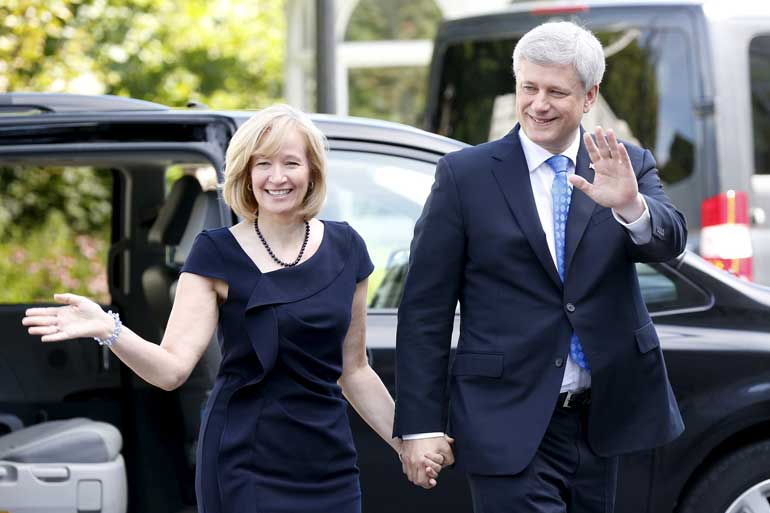Wednesday Mar 04, 2026
Wednesday Mar 04, 2026
Monday, 3 August 2015 00:00 - - {{hitsCtrl.values.hits}}
 Canada’s Prime Minister Stephen Harper and his wife Laureen Harper arrive at Rideau Hall to ask Governor General David Johnston to dissolve Parliament, beginning the longest federal election campaign in recent history, in Ottawa - REUTERS
Canada’s Prime Minister Stephen Harper and his wife Laureen Harper arrive at Rideau Hall to ask Governor General David Johnston to dissolve Parliament, beginning the longest federal election campaign in recent history, in Ottawa - REUTERS
OTTAWA (Reuters): Canadian Prime Minister Stephen Harper was set to call a parliamentary election for 19 October on Sunday, kicking off a marathon 11-week campaign likely to focus on a stubbornly sluggish economy and his decade in power.
Harper’s office said in a statement he is due to visit Governor General David Johnston – the representative of Queen Elizabeth, Canada’s head of state – at 9:55 am (1355 GMT).
Harper is expected to seek the dissolution of Parliament, triggering the start of the campaign.
Polls indicate that Harper’s right-of-centre Conservative Party, which has been in office since 2006, could well lose its majority in the House of Commons.
That would leave Harper at the mercy of the two main centre-left opposition parties, who could unite to bring him down. Minority governments in Canada rarely last more than 18 months.
Harper, 56, says only he can be trusted to manage an economy that is struggling to cope with the after-effects of below-par global growth and a plunge in the price of oil, a major Canadian export.
The Conservatives are trailing slightly behind the left-leaning New Democrats (NDP), who have never governed Canada. The Liberals of Justin Trudeau are well behind in third.
Both parties say Canada needs a change from Harper, who has cut taxes, increased military spending, toughened the country’s criminal laws and streamlined regulations governing the energy industry.
Five of Canada’s last six election campaigns have lasted the minimum length of just over five weeks.
The Conservatives have deep pockets and the campaign - the longest in modern Canadian history and the third longest on record - will allow them to run a wave of attack ads. Opposition parties say this is an abuse of the system.
Ipsos Public Affairs pollster John Wright said the chances of the Conservatives winning any kind of government were 50 percent, down from 88% last year.
Harper has dismissed opposition calls for increased government spending to stimulate the economy.
Data released on Friday showed gross domestic product shrank in May, the fifth decline in a row. The figures suggest the economy was likely in a technical recession in the first half of 2015.
At time of dissolution, the Conservatives had 159 seats in the 308 seat House of Commons, the NDP 95 and the Liberals 36. The new House will contain 338 seats.